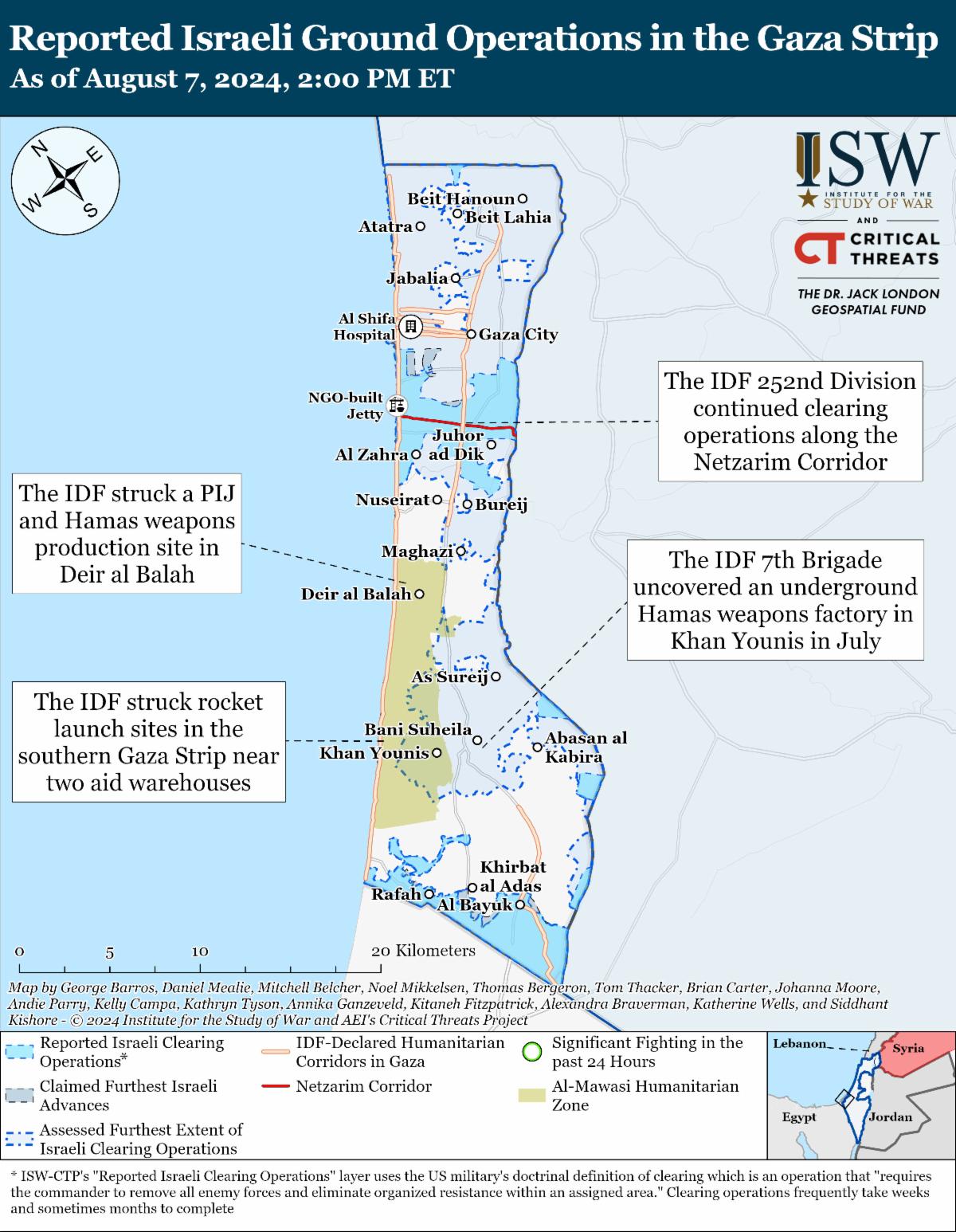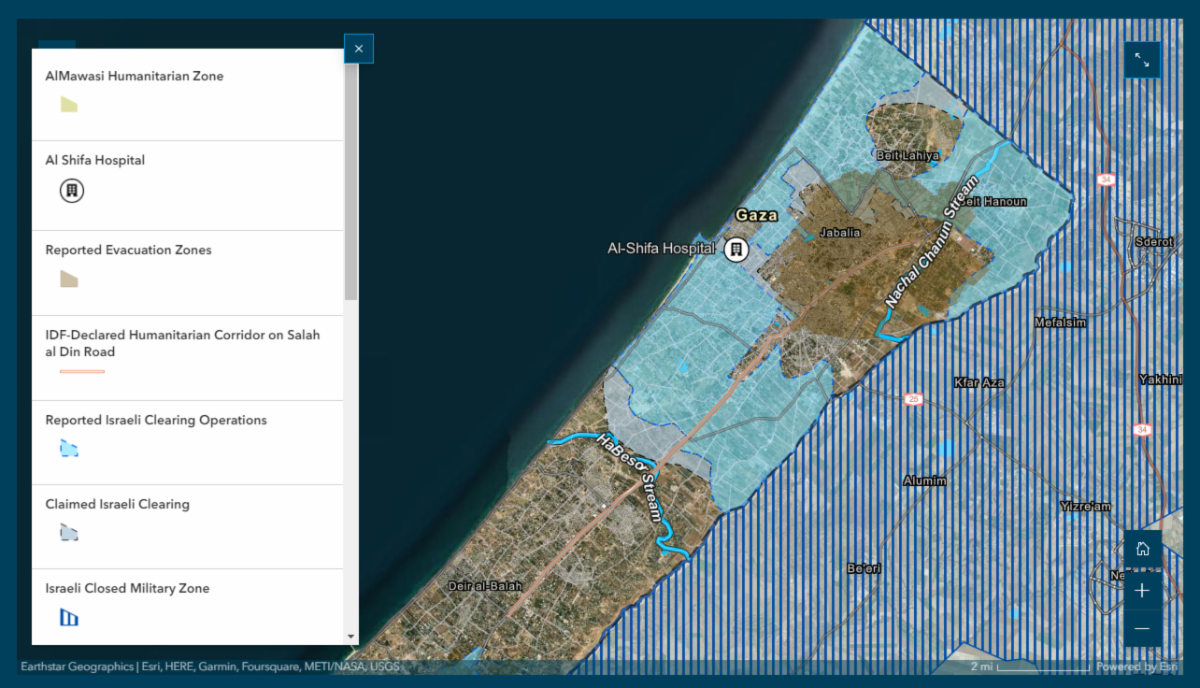Acting Iranian Foreign Minister Ali Bagheri Kani defended Iran’s impending retaliatory strike against Israel while signaling that Iran seeks to avoid a regional war during an Organization of Islamic Cooperation meeting in Jeddah, Saudi Arabia, on August 7. Bagheri Kani argued that Iran “has no choice” but to exercise its right to self-defense and restore deterrence against Israel. This is consistent with CTP-ISW's assessment that Iran is likely planning a retaliatory attack on Israel to restore deterrence after the failed Iranian April 2024 attack while Iran simultaneously tries to avoid a large-scale war with Israel. Iran and its allies fired around 170 one-way attack drones, 30 cruise missiles, and 120 ballistic missiles at Israel in the April 2024 attack. The United States, Israel, and their allies intercepted most of the projectiles, and the Iranian attack did significantly less damage than Tehran intended. Iranian leaders likely calculate that they failed to deter Israel with their April 2024 attack because they did not inflict serious damage.
Iranian armed forces–run media is continuing to publish information that likely aims to decrease Israel’s ability to effectively defend against an Iranian attack by causing Israel to disperse its air- and missile-defense assets. Iranian armed force-run outlet Defa Press argued on August 7 that Iran and the Axis of Resistance should target Israel from multiple directions to disperse Israeli assets, thereby exposing targets. Defa Press claimed that Iran and its Axis of Resistance could increase the volume of munitions targeting specific targets, particularly “sensitive military bases,” to exploit such vulnerabilities. Iran may or may not try to attack any of these targets or others. CTP-ISW assessed on August 4 that Iran and its Axis of Resistance will most likely conduct a coordinated, large-scale drone and missile attack on Israel in response to Israel killing Hamas Political Bureau Chairman Ismail Haniyeh in Tehran. Iran’s suggestion that it should target Israel from multiple directions does not, however, validate this August 4 assessment because publicizing relatively specific information like this is likely intended to generate informational effects. The August 7 report is a continuation of previous Iranian reporting covering how Iran will conduct its retaliatory strike. Defa Press published a list of potential Israeli civilian and military targets spread throughout Israel on August 5 which CTP-ISW suggested was likely also meant to cause Israeli Defense Forces (IDF) to disperse air- and missile-defense assets across a wide area. This ongoing information effort probably intends to increase the likelihood that Iran can hit some of its targets, but it is not clear that this effort will be successful. The US-Israeli coalition intercepted most Iranian drones and missiles outside of Israel during the April 13, 2024 attack on Israel.
The Islamic Resistance in Iraq—a coalition of Iranian-backed Iraqi militias—is expected to conduct “continuous” strikes on US forces in Iraq and Syria “in the coming period” according to an unspecified leader in Harakat Hezbollah al Nujaba cited by Lebanese news outlet al Akhbar on August 7. The new attack campaign is reportedly in retaliation for Israel’s killing of Haniyeh and senior Hezbollah commander Fuad Shukr and to continue Iranian-backed Iraqi militia efforts to expel US forces from Iraq and Syria, according to unspecified sources affiliated with the Islamic Resistance in Iraq. The Islamic Resistance in Iraq’s attack campaign targeting US forces in Iraq and Syria supports Iranian efforts to conduct a retaliatory strike on Israel by attempting to draw US attention and resources away from supporting Israel’s defense. The United States, Israel, and partners in the region collectively intercepted approximately 99% of all munitions launched by Iran during its April 2024 attack.
Key Takeaways:
- Iranian Retaliation: Acting Iranian Foreign Minister Ali Bagheri Kani defended Iran’s impending retaliatory strike against Israel while signaling that Iran seeks to avoid a regional war during an Organization of Islamic Cooperation meeting in Jeddah, Saudi Arabia, on August 7.
- Hamas Succession: The Axis of Resistance and Iran are coalescing around Yahya Sinwar as Hamas’ new leader. Sinwar’s leadership is very unlikely to change Hamas’ maximalist position on ceasefire and hostage negotiations in the Gaza Strip.
- Houthis in Iraq: The death of a Houthi drone expert responsible for training Iranian-backed Iraqi militias in the July 30 US strike in Iraq indicates a possible Iranian-backed effort to improve the targeting capabilities of the Iranian-backed Iraqi militias against both US forces and Israel. The Houthi decision to deploy this commander to Iraq to train Iraqi militias suggests that Iran and the Houthis seek to rapidly accelerate the training of these militias.
- Russia and Iran: Russian officials are continuing coordination with Iran ahead of the Iranian retaliatory strike against Israel out of concern for Russian interests in the region. Russia is also reportedly assisting Iranian efforts to improve its air defenses against Israeli attacks, according to the New York Times.
- Iranian Nuclear Program: The US Office of the Director of National Intelligence (ODNI) highlighted a “notable increase” in Iranian statements on Iran’s ability to product a nuclear weapon, corroborating previous CTP-ISW reporting. CTP-ISW has noted that senior Iranian officials have normalized public discussions about Iran’s ability to procure a nuclear weapon.
- Jordan: Qatari-owned, London-based al Araby al Jadeed reported on August 6 that Jordan expressed concern to Iraq about Iranian-backed Iraqi militias’ presence along the Jordan-Iraq border, citing two Iraqi officials. Jordan is reportedly particularly concerned about the possibility that Iranian-backed Iraqi militias will fire drones and missiles from areas close to the Jordanian border towards Israel.
| 






 [ISW] 이스라엘-하마스 전쟁(이란) 업데이트, 2024년 8월 6일
[ISW] 이스라엘-하마스 전쟁(이란) 업데이트, 2024년 8월 6일